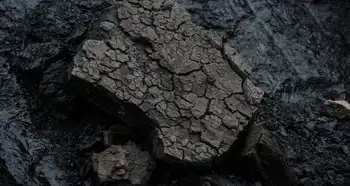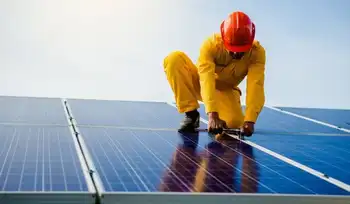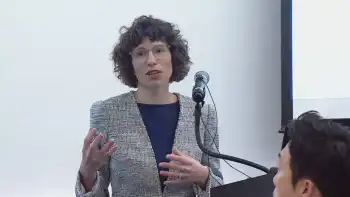Congress considers nuclear to reduce emissions
The accidents at Three Mile Island and Chernobyl in Russia turned many against nuclear. No new plants have been opened in the U.S. in more than two decades. The proposed nuclear waste repository at Nevada's Yucca Mountain may have its funding cut off by Washington.
But there are signs the opposition is waning thanks to cap-and-trade. The Environmental Protection Agency says that since nuclear creates no carbon emissions, expanding it would make it easier to meet carbon-reduction goals.
In October 14 testimony before the Senate Energy Committee, Reid Harvey, chief of the EPA's climate economics branch, said his agency included substantial increases in nuclear power in its analysis of climate change bills in Congress.
"The availability of nuclear power has a significant impact on our results," Harvey said.
Without it, he says, the cost of cap-and-trade allowances — the permits business would have to buy to release carbon emissions — would rise by as much as 15%.
Sen. John Kerry, D-Mass., co-author of the Kerry-Boxer cap-and-trade bill, now backs nuclear. He co-authored with Sen. Lindsey Graham, R-S.C., an October 11 op-ed that laid out his position.
"Nuclear power needs to be a core component of electricity generation if we are to meet our emission reduction targets," the two wrote in the New York Times.
They called for jettisoning "cumbersome regulations" in favor of a "streamlined permit system" to create new nuke plants. Kerry again touted nuclear in a separate press release.
At a town hall in New Orleans on October 15, President Obama touted nuclear, saying there was "no reason" why we couldn't use nuclear power safely. "Japan does it and France does it," he said.
Whether there is a filibuster-proof Senate majority for this approach is unclear.
"Nuclear has my vote," said Sen. Judd Gregg, R-N.H. "The question is whether it has 60 votes."
A nuclear glow might warm some Republicans to a cap-and-trade bill.
But green groups remain wary. On October 8, a coalition including the Sierra Club, the Natural Resources Defense Council and others sent senators a letter urging them to "reject any provisions" that streamline licensing for nuke plants.
"Any further acceleration would fatally undermine public confidence in the safety of U.S. reactors," they wrote.
Sen. Joe Lieberman, I-Conn., is leading a behind-the-scenes effort to build a bipartisan coalition tying nuclear and cap-and-trade together. It will be added as a floor amendment to the bill during the Senate debate, according a Senate source.
Those involved in crafting the amendment describe it as a tough balancing act. Even Graham may not be on board.
"Keep in mind that Senator Graham has not signed on to the Kerry-Boxer (cap-and-trade) bill. As our op-ed said, this is about a fresh start," Graham spokesman Kevin Bishop said. Nor is he backing Waxman-Markey or any other related bill.
Anything that brings aboard more Republicans could alienate Democrats. Sen. Lisa Murkowski, R-Alaska, a cap-and-trade critic, has said she could nevertheless back it if it included expansions of nuclear and oil drilling.
"Nuclear power must be part of the solution," Murkowski told C-SPAN.
But legislation is just one of the roadblocks to expanding nuclear, Murkowski's spokesman Robert Dillon says. The last energy bill, he notes, included loan guarantees for nuclear but the Bush administration never implemented them.
"It takes more than 60 votes. Whatever passes Congress has to be implemented by the administration. So that is your bigger question," Dillon said.
Other problems include an uncertain financial climate. The plants are risky investments without loan guarantees. Regulatory hurdles, such as where to put spent nuclear fuel, can also be daunting. Senate Majority Leader Harry Reid, D-Nev., pushed hard to have the nation's main proposed repository — which was to be located in his state — closed down.
"The end of the Yucca Mountain project is a victory for every Nevadan, every American, and all who work so hard to keep our state and our country as safe and clean as they deserve to be," he declared in a May press release after the administration zeroed out funding for it.
Such complications caused Sen. John McCain, R-Ariz., himself a fan of nuclear power, to ask why the EPA and other agencies are counting on expansions of nuclear in estimating climate change bills.
After the EPA's Harvey testified, McCain pointed out that none of the climate bills under debate guarantee an expansion of nuclear power.
"Unless there are significant changes, we are looking at a stagnant industry," McCain said.
The industry itself is a little more optimistic. Mitchell Singer, spokesman for the Nuclear Energy Institute, notes that while nothing in any current bill specifically advances nuclear, under the House bill at least nuclear could qualify for clean energy loans.
"The bottom line is that when you see this support from Kerry and that in Waxman-Markey there is an acknowledgement of nuclear, when (the bill's authors) have never been friends of this industry, it definitely bodes well for the future," Singer said.
Democrats might feel pressure to make concessions on nuclear and drilling so President Obama has some legislation in hand when he heads to Copenhagen next month for global climate talks.
Related News

Ireland goes 25 days without using coal to generate electricity
DUBLIN - The island of Ireland has gone a record length of time without using coal-fired electricity generation on its power system, Eirgrid has confirmed.
The all-island grid operated without coal between April 11th and May 7th – a total of 25 days, it confirmed. This is the longest period of time the grid has operated without coal since the all-island electricity market was introduced in 2007.
Ireland’s largest generating station, Moneypoint in Co Clare, uses coal, as do some of the larger generation sites in Northern Ireland.
The analysis coincides with the European statistics agency, Eurostat publishing figures showing annual CO2 emissions…





